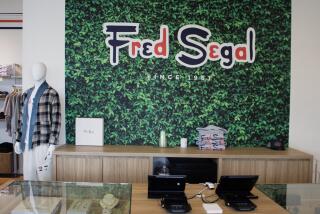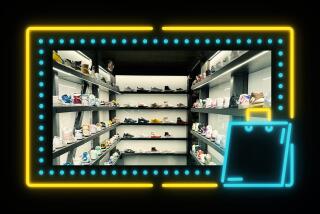Retail Firm Weathers Tests of Time, Trends
- Share via
Every night at 9, Windsor Fashions Chief Executive Maurice Zekaria begins a round of calls to managers of his 25 dress shops, as he has for 41 years. It is no longer necessary. A 4-year-old computer system tracks daily sales and inventory at each store.
But the nightly pep talks from 71-year-old Zekaria demonstrate a commitment that has helped the family-owned company survive recessions and fashion trends that destroyed larger competitors.
And as Zekaria’s sons assume control of the business, they are taking care to preserve the personal touches that set Los Angeles-based Windsor apart in an industry dominated by publicly traded chains.
Known among Southern California teenage girls as the first stop for prom wear, Windsor is trying to build its year-round business by dipping more heavily into everyday fashions. Stores brim with colorful scarf dresses and python print pants, pitting Windsor against such fashion-forward junior’s chains as Wet Seal and Bebe.
Besides broadening its clothing lines, Los Angeles-based Windsor is pushing into new territory. Brothers Leon and Ike Zekaria have opened stores in Connecticut, Texas and Michigan and have set up shop on the Internet, where Windsor offers a gown registry so girls attending the same prom can avoid the horror of wearing identical dresses.
From its beginning as a single dress shop on Los Angeles’ Miracle Mile, Windsor Fashions has become the region’s best-kept secret at prom season. Though the chain does no advertising, stores become so crowded at prom time that girls call ahead to reserve dressing rooms. When stores are jammed, teens may try on only four dresses at a time--unless they are accompanied by their mothers.
The chain has such clout in the business that well-known junior’s designers Zum-Zum and Jessica McClintock create exclusive dresses for Windsor Fashions. It is among Jessica McClintock’s top three accounts.
“They are a very important customer for us,” said Angie Livas, sales manager for New York-based Zum-Zum. “They really know their customer, and they are one of the few specialty chains that has a profitable business.”
The Zekarias’ challenge is to persuade prom-goers such as Rachel Lopez to shop between formal dances. On a recent Friday evening, Lopez, 17, breezed into the Windsor Fashions store in Montclair and tried on four dresses before choosing an aqua crepe gown with a jeweled neckline. On her way to the checkout counter, she picked up a silvery necklace and matching tiara.
Lopez, a senior at Chino High, knew she’d find a gown at Windsor. She had purchased dresses for her winter formal and a wedding at the store. But to fill out her weekday wardrobe, Lopez shops at Clothestime and Mervyn’s.
“I just get my dresses here,” she said of Windsor. “I don’t know why.”
To grab the attention of fashion-conscious teens, the Zekarias have embarked on a costly store renovation that they hope to complete over the next three years. At a cost of $500,000 to $700,000 per store, they are making shops over in pink and purple hues, creating boutiques for special-occasion dresses and placing PCs near the checkout counter so girls can order out-of-stock items online.
Posters of models in cutting-edge fashions cover one of two picture windows, a compromise. Leon and Ike wanted the posters to create a high-fashion look, but Maurice long resisted window displays because they block customers’ views of merchandise inside the store.
The Zekarias also have increased the amount of private-label clothing sold at Windsor. They hope that fashion-forward clothes under the Windsor label will boost the image of the chain. As an additional benefit, private-label merchandise tends to be more profitable than brand-name garments.
“The customer cares less about who made it than where it was bought,” said Leon Zakaria, president of Windsor.
Since its inception in 1937, Windsor--founded by Maurice’s brother, an Iraqi immigrant who named it for Windsor Castle--has specialized in formal wear. Why?
“A woman will spend her last dollar on a dress to catch a man,” said Maurice, who bought out his brother in 1959. “If a women goes into a store to buy something else, and sees a dress she likes, she’ll buy it.”
The 1990s recession set the stage for refocusing Windsor Fashions. Losing money in late 1993, the Zekarias briefly considered putting the company in bankruptcy. But the family realized that a Chapter 11 filing would damage decades-long relationships with suppliers. And it would make it difficult for Maurice to recover the $1 million from his own funds he invested in Windsor during the recession to keep it going.
“I realized that if we filed, the company would not recover,” said Leon, 36.
He persuaded his father to take an equally risky route. The company closed under-performing stores and invested $500,000 in a computer system that made it possible for the first time to track sales and inventory daily. Until then, the Zekaria brothers said, the company relied on hand-tallied quarterly reports that made it impossible to quickly reorder popular items or mark down poor sellers.
Besides closing stores, the brothers also shook up Windsor’s corporate staff. About 10 of 25 headquarters employees were let go, including most of the buyers. It was a painful episode for a company where many employees had worked for decades. Recalling the event, Maurice is pragmatic. “It was necessary.”
Leon and Ike, 29, instituted training and development programs to build loyalty and expertise among employees. In a brave step, the brothers opened the company’s books so employees could see the performance of each store. They started a program where store clerks and managers share in a store’s profits. Regional heads share in the profits of their divisions.
And employees attend training sessions as part of “Windsor University,” where they can pick up skills to enable them to advance within the chain.
The recession, which claimed such chains as Judy’s and Lanz, also taught the Zekarias to look beyond California. Hoping to reduce its dependence on the state’s economy, Windsor worked with mall developers to open stores in affluent locations. Of its 25 stores, nine are outside Southern California: in Nevada, Texas, New Jersey, Michigan and Connecticut. Five more are scheduled to open in the next 10 months.
The Internet, while accounting for a small percentage of Windsor’s sales, has expanded the company’s reach to Alaska and Montana.
“I would never imagine that girls would buy prom dresses over the Internet, but they are,” Leon said.
The Zekarias say their strategy is paying off. Sales in 1999 totaled $35 million, up from $18 million in 1996, when Windsor had 21 stores. Profits have steadily climbed since 1995, when the company first broke even after suffering losses in the recession.
Significantly, Windsor has become less dependent on proms and other teenage events, such as homecoming. The Zekarias say 35% of sales come from special-occasion dresses, including prom gowns, compared with 50% in the early 1990s.
For all the change, Windsor maintains its traditions. Each employee receives an anniversary card on his or her hiring date. And each store has a budget for a Christmas party; managers are flown to Los Angeles for a party where Maurice’s wife, Alice, prepares Middle Eastern food.
Montclair store manager Natalie Smykla says she appreciates the nightly call from Maurice; his sons say he interrupted a family Seder last month to make the calls.
“It would take a lot of money for me to work somewhere else,” said Smykla, whose resume includes stints at Wet Seal and LA Fitness. “There is a real family feeling here.”






